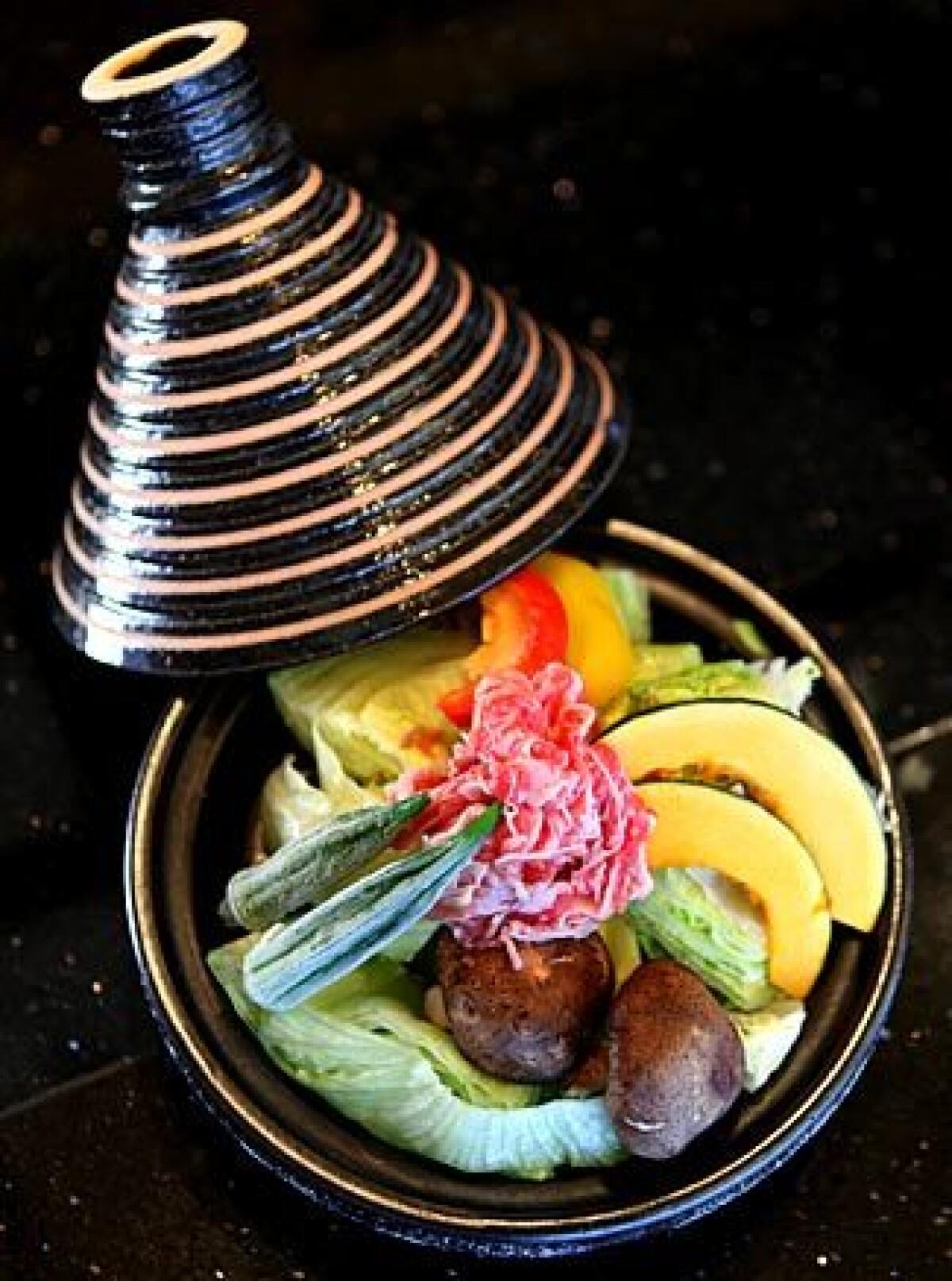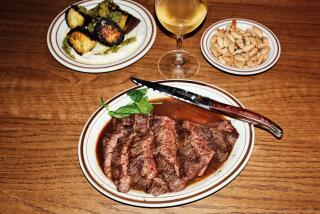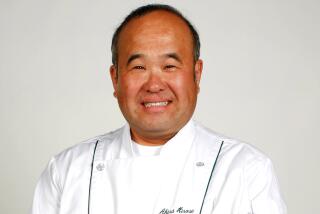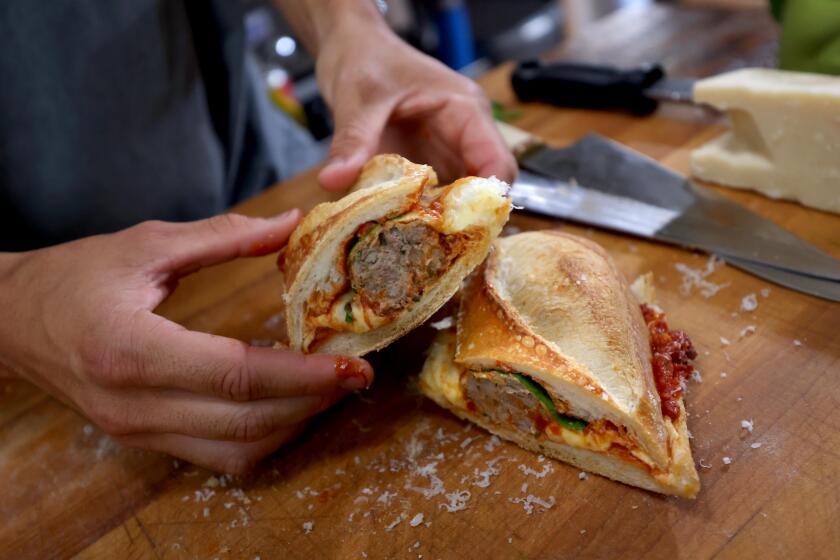The Find: Oumi Sasaya noodle house in Lomita

A queue of naked noodles waits to be dressed with delicate daikon sprouts, quivering poached eggs and oil-slicked strips of blackened bell pepper. Ingredients are plucked from bowls, plates, bottles and jars and laid onto the loose nests of udon, each shard of seaweed and ring of green onion in its right place. Lomita’s Oumi Sasaya is a noodle house of seemingly effortless elegance, minimalism maximized to the fullest.
It’s a feat achieved in the details. Here, waitresses pour pitchers of broth with one hand guarding against even the smallest splash, and hourglasses accompany orders of hot sake, which aren’t to be sipped until the last grain of sand tumbles down to the dune below. The restaurant is dedicated to these simple rituals of service that reflect its meticulous Kansai-style noodling.
But whereas some shops strive for completism, Oumi Sasaya doesn’t dabble in soba or ramen — the restaurant concerns itself solely with udon. And those chubby noodles are taken seriously: The South Bay eatery imports its wheat flour and other essential ingredients directly from Japan and makes its udon fresh every day.
That exactitude is what packs the place with a loyal congregation of Japanese-speaking diners. Reservations aren’t a consideration (they don’t accept them) — simply show up, sign in and wait for your turn.
Those who prefer to slurp stick to soups, but there’s a quiet brilliance about Oumi Sasaya’s udon plates. Most are understated, like the sesame chicken tempura udon. Atop a tangle of supple, silken noodles boiled just beyond al dente are filament-thin slivers of cucumber, cabbage, nori, sweet roasted bell pepper and hunks of just-golden chicken tempura. A cup of toasty sesame dressing is served on the side. It’s a composition in every sense, a dish that balances color with flavor, texture with scent.
Bolder is the tororo udon with beef and dou ban jiang. Tororo is a starchy Japanese mountain yam grated and transformed into a wet, glutinous mass that oozes along like something from an elementary chemistry class. It acts like a tasteless, mucilaginous adhesive, binding the udon to wisps of tender beef, green onions, nori and dots of dou ban jiang, a ruddy, spicy paste of fermented broad beans. Capping it all is an unctuous poached egg.
There are about a dozen soups with which to keep warm, traditional options like kitsune udon (a Kansai favorite blanketed with sheets of fried, sweetened tofu) and powerfully oceanic wakame seaweed udon. Or cozy up to the curry udon soup with shrimp and mochi tempura. The broth is a mild mahogany curry reminiscent of what you might find ladled over pork katsu. The shrimp are beyond jumbo, the mochi a chewy contrast to the slippery noodles.
Oumi Sasaya’s udon-suki is noodle soup at its bubbling best, a communal hot pot of seafood, meat, vegetables and udon all cooked in a bowl of boiling broth. Clams are laid in first, shells opened to the katsuobushi-rich stock. Next, a server arrives with a bamboo tube packed with ground chicken from which she methodically scrapes bite-sized pellets into the bowl. They briefly sink below the surface before buoying back into sight, reemerging from the depths as chicken meatballs. A plate of udon is then carefully slid into the soup.
The rest of the cooking is up to you: ribbons of washu beef, scallops, shrimp, tofu, fish cake, chicken, shiitake mushrooms, mustard greens, cabbage and green onions. It’s an elaborate meal of shared efforts and experiences, one of mothers lovingly feeding their families and couples crossing chopsticks in search of that last scallop.
There’s more than just udon — rice bowls for lunch, grilled salmon for dinner — so consider the beef and vegetable tagine. In Japan, the conical Moroccan vessel has become a popular tool for healthy cooking. And the restaurant uses it for exactly that. Beef is steamed until it almost evaporates, vegetables (cabbage, okra, bell pepper, mushrooms, zucchini and kabocha squash) are moist but not mushy. With an accompanying cup of ponzu, the tagine is umami at its lightest, most potent.
At Oumi Sasaya, there’s transcendence even in the elemental.
Oumi Sasaya
Location: 2383 Lomita Blvd., Suite 101, Lomita, (310) 530-4661 (reservations not accepted), https://www.oumisasaya.com.
Price: Udon plates and soups, $7.50 to $12; udon-suki, $18 to $28; dinner entrees, $5.50 to $14; salads and sides, $1.20 to $9.50.
Best dishes: Sesame chicken tempura udon, tororo udon with beef and dou ban jiang, curry udon soup with shrimp and mochi tempura, udon-suki, beef and vegetable tagine.
Details: Open 11:30 a.m. to 2 p.m. and 5:30 p.m. to 9 p.m. Tuesdays through Sundays. Beer, wine, sake. Lot parking. Credit cards accepted.
More to Read
Eat your way across L.A.
Get our weekly Tasting Notes newsletter for reviews, news and more.
You may occasionally receive promotional content from the Los Angeles Times.










